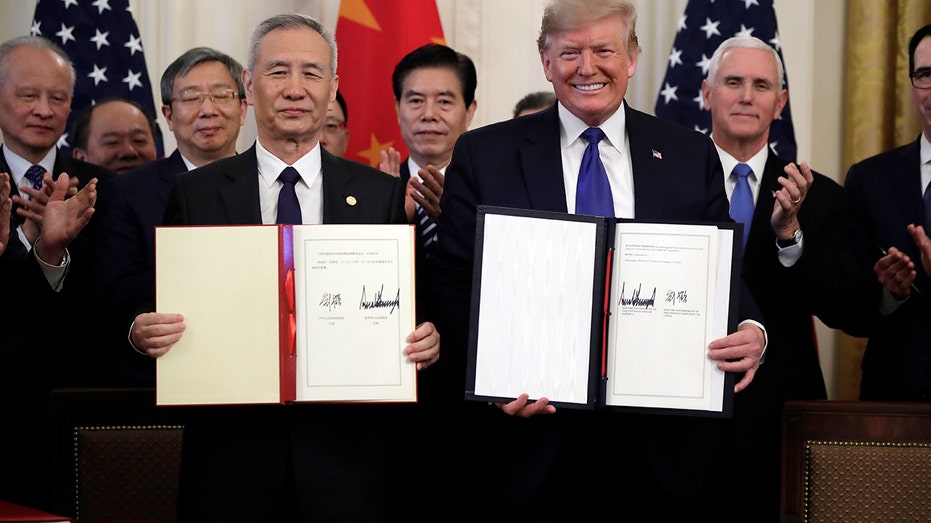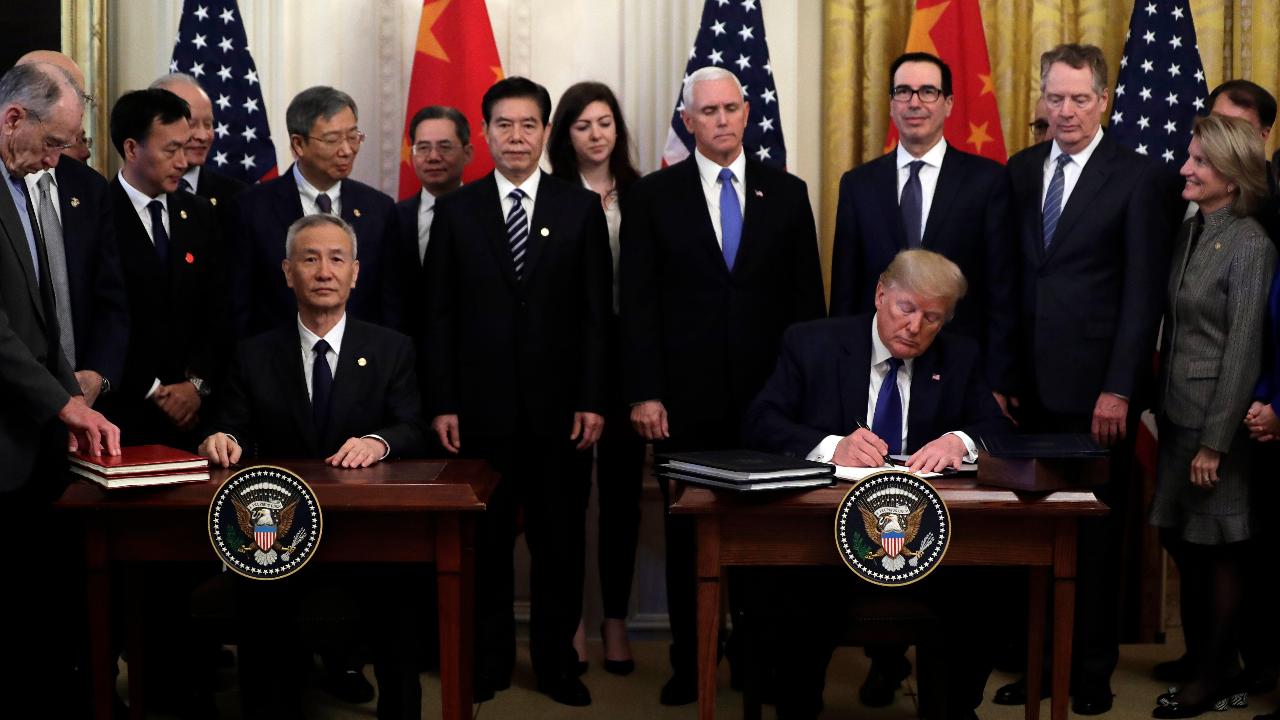China to halve tariffs on some U.S. imports as virus risks escalate
Tariffs levied on some U.S. goods will be cut to 5 percent from 10 percent
China on Thursday said it would halve additional tariffs levied against 1,717 U.S. goods last year, following the signing of a Phase 1 trade deal that brought a truce to a bruising trade war between the world's two largest economies.
While the announcement comes about three weeks after the first phase of the trade pact was inked, it is also seen by analysts as a move by Beijing to boost confidence amid a virus outbreak that has disrupted businesses and hit investor sentiment.
GET FOX BUSINESS ON THE GO BY CLICKING HERE
China's finance ministry said in a statement that from 0501 GMT on Feb. 14, additional tariffs levied on some goods will be cut to 5 percent from 10 percent previously and others lowered to 2.5 percent from 5 percent.
The ministry did not state the value of the goods affected by the decision, but the products benefiting from the new rule are part of the $75 billion of goods that China announced last year that it would impose 5 percent to 10 percent tariffs on, which came into effect on Sept. 1.
In a separate statement, the finance ministry said the tariffs reduction corresponds with the those announced by the United States on Chinese goods, which were also scheduled for Feb. 14.
US, CHINA SIGN HISTORIC PHASE ONE TRADE DEAL
"This like-for-like reduction is a reciprocal action, a consistent stance the Chinese government has adopted throughout the trade war," said ANZ Chief Economist for Greater China Raymond Yeung.
Further adjustments would depend on the development of the bilateral economic and trade situation, the ministry said.
The reductions will cut tariffs on soybeans from 30 percent to 27.5 percent, although some traders say the impact could be limited as the 25 percent tariffs remains in place. Duties on crude oil will fall to 2.5 percent from 5 percent that was imposed in September.

President Donald Trump signs a trade agreement with Chinese Vice Premier Liu He, in the East Room of the White House, Wednesday, Jan. 15, 2020, in Washington. (AP Photo/Evan Vucci)
The remaining tariffs were scheduled to kick in Dec. 15, but were suspended due to the interim trade deal.
Separately on Thursday, China's Global Times reported Beijing is considering using a disaster-related clause in the Phase 1 deal due to the coronavirus outbreak, citing an unnamed Chinese trade expert close to the government.
"Any move to de-escalate is always good. Especially, when the market is overwhelmed by the news about virus, good news about tariff is refreshing," said Tommy Xie, head of Greater China research at OCBC Bank in Singapore.
"The announcement shows China's commitment to implement the phase one trade deal despite the disruptions from the recent virus outbreak," said Xie.
The news was positive for financial markets and comes as Beijing seeks to shore up investor and business confidence in China as a virus outbreak casts deep uncertainty over the economic outlook.
The yuan hit its highest in two weeks, while Asian stocks and Wall Street futures also rallied after the announcement.
READ THE FULL US-CHINA PHASE ONE TRADE DEAL
China's finance ministry said it hopes both sides can abide by the trade deal and implement it to boost market confidence, push bilateral trade development and aid global economic growth.
Some analysts had said following the trade deal that China may need to roll back some of the tariffs on U.S. goods such as soybeans and crude oil in order to meet its purchasing commitments. Other analysts also noted such moves are expected to cushion faltering growth at home.
"Under the phase 1 deal, China has to meet a tough target to increase U.S. import by $100 billion this year, so a measure like this was necessary and expected," said Tomo-o Kinoshita, global market strategist at Invesco Asset Management.
CLICK HERE TO READ MORE ON FOX BUSINESS
"But at the same time, that they did this now points to their desire to support Chinese companies as the coronavirus epidemic will obviously deal a huge blow to China's growth," he added.
(Reporting by Se Young Lee, Lusha Zhang, Yawen Chen, Winni Zhou, Hallie Gu, Dominique Patton and Gabriel Crossley; Editing by Himani Sarkar and Sam Holmes)




















